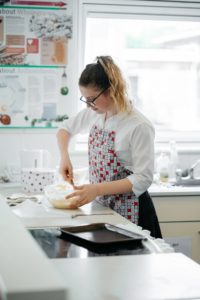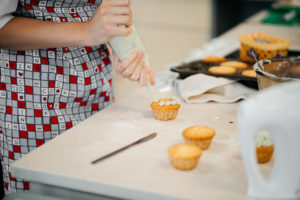Curriculum Intent

Food is an essential and joyous part of our daily lives: a healthy balanced diet improves both quality of life and life expectancy. Students are encouraged to create a range of diverse dishes and to understand how the constituent macro and micro-nutrients help to grow, maintain and repair their bodies. They will also develop an understanding of how different cooking methods scientifically affect their ingredients, again furthering both curiosity and repertoire as they grow in independence. Strong cross-curricular links are formed with all three Science disciplines, particularly Biology, and students are encouraged to undertake practical investigations which allow them autonomy to develop their analytical skills. Food is also a pathway to empathy; the interplay of traditions and customs that shape our world cuisine are explored and celebrated through both practical work and discussion.
Food and Nutrition students at SHSG will gain a broad range of vital life skills which will increase their independence and empower them to feed themselves and others affordably and nutritiously, both now and later in life. A sound understanding of food and nutrition ultimately shapes a student’s future and fuels success at every stage in life.
What does it feel like to be a student in the Food Department?

The Food Preparation and Nutrition syllabus equips you with the understanding, knowledge and skills required to cook and apply the principles of food science, food nutrition and healthy eating. An early focus on food safety ensures that you will be able to develop your knowledge and skills within a clear framework of safe working practices. You will be encouraged to experiment and adapt recipes you cook, developing your confidence and independence. It enables you to make informed decisions about food and nutrition which will enable you to be able to feed yourself and others affordably and nutritiously and promote good physical and mental health.
You will be encouraged to carefully consider the needs of others, through exploring our differing nutritional needs and cultural influences; you will also learn how to accommodate those who have to eliminate certain ingredients for reasons of health, or religious or ethical frameworks. This will allow you to become a more creative and empathetic person, as well as broadening your culinary horizons. You will also be confronted by the impact of your food choices, as sustainability, food poverty and food wastage are all explored through the course.
As you study, the strong links between science, humanities and PE will facilitate your development across the breadth of your KS3 and 4 studies, as well as equipping you with essential life skills and understanding.
Please click on the button below to download the assessment policy for Food Preparation and Nutrition.
